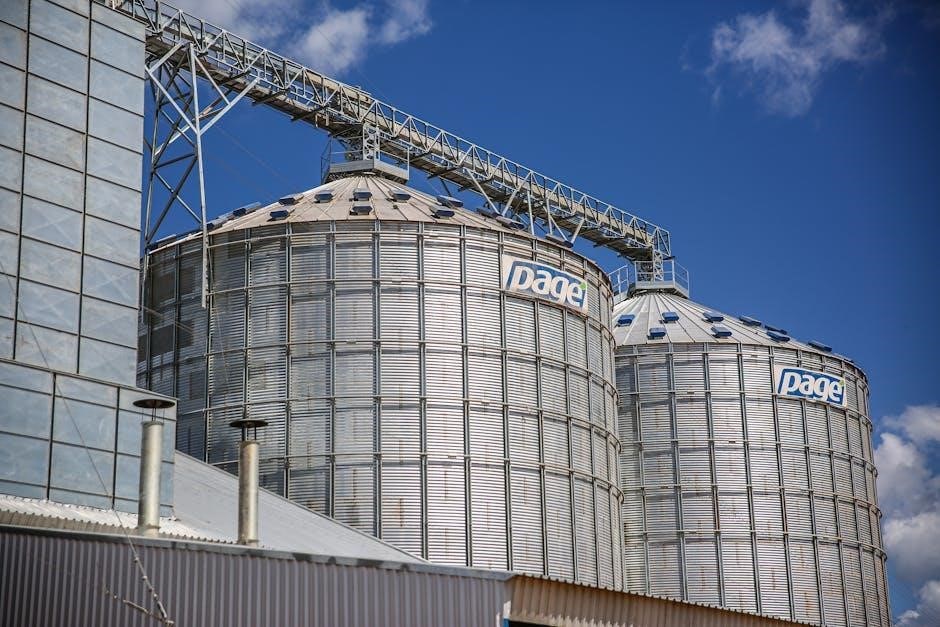Operating a food truck in Arkansas requires adherence to specific state and local regulations. These include obtaining necessary licenses, permits, and complying with health and safety standards to ensure legal operation.
1.1 Overview of Food Truck Regulations in Arkansas
Arkansas food truck regulations are designed to ensure public health and safety while promoting a thriving mobile food industry. These regulations encompass licensing, permits, health inspections, and zoning restrictions. Food trucks must meet state and local standards, including proper food handling, sanitation, and equipment maintenance. Additionally, operators must comply with fire safety measures and parking restrictions. Understanding these regulations is crucial for legal operation, as non-compliance can result in fines or business closure. The compliance process involves obtaining necessary permits and passing regular inspections. By adhering to these rules, food truck owners can operate successfully within Arkansas.
1.2 Importance of Compliance with State and Local Laws
Compliance with state and local laws is vital for food truck operators in Arkansas to avoid legal penalties and ensure consumer safety. Adhering to regulations builds trust with customers and maintains a positive reputation. Non-compliance can lead to fines, permit revocation, or even business closure. Compliance also ensures that food trucks meet health and safety standards, reducing risks of foodborne illnesses. By following laws, operators contribute to a fair and regulated market, fostering a competitive environment. Understanding and adhering to these requirements is essential for the long-term success and sustainability of any food truck business in Arkansas.

Licensing and Permit Requirements
Food trucks in Arkansas must obtain state and local licenses to operate legally. This includes food service permits, business registration, and health department approvals to ensure compliance with regulations.
2.1 State-Level Licenses for Food Trucks
Obtaining state-level licenses is crucial for operating a food truck in Arkansas. The Arkansas Department of Health issues food service permits, ensuring compliance with health regulations. Additionally, food trucks must register with the state’s revenue office for sales tax collection. A business license from the Secretary of State is also required to legally operate. The process involves submitting applications, paying fees, and providing documentation such as menus and kitchen layouts. Licenses must be renewed annually, with inspections conducted by state health officials to maintain compliance. These requirements ensure food trucks meet Arkansas’s legal and sanitary standards for safe food service.
2.2 Local Permits and Municipal Regulations
Local permits and municipal regulations in Arkansas add another layer of compliance for food truck operators. Each city or county may have its own set of rules, such as zoning restrictions, parking permits, or specific health inspections. For example, Fayetteville requires a food truck permit, while Little Rock mandates fire department inspections. Operators must research and obtain these local permits before operating in any municipality. Additionally, some cities impose restrictions on where food trucks can park or operate, such as near schools or in residential areas. Understanding and complying with these local regulations is essential to avoid fines and ensure smooth operations across different jurisdictions.

Health and Safety Standards
Arkansas mandates strict health and safety standards for food trucks, including proper food handling, sanitation, waste disposal, and regular inspections to ensure consumer safety and compliance.
3.1 Food Handling and Preparation Regulations
Arkansas food trucks must follow strict food handling and preparation regulations to ensure public safety. This includes proper food storage, handling practices, and cooking temperatures. Food must be prepared in licensed kitchens, and all food handlers must receive proper training. Trucks are required to maintain accurate temperature controls for both hot and cold foods. Cross-contamination prevention measures must be in place, and all food waste must be disposed of properly. Regular inspections by health officials ensure compliance with state and federal guidelines. Additionally, food trucks must use approved food sources and adhere to HACCP plans if serving potentially hazardous foods.
3.2 Sanitation and Hygiene Requirements
Arkansas food trucks must maintain high sanitation and hygiene standards to protect public health. Proper waste disposal systems are mandatory, and all surfaces must be cleaned and sanitized regularly. Handwashing stations with hot water, soap, and paper towels are required for staff. Food preparation areas must be kept clean, and all utensils and equipment must be sanitized before use. Cleaning schedules should be posted and adhered to, and approved cleaning products must be used. Regular inspections ensure compliance with state health codes. Proper storage of cleaning supplies and waste is also essential to prevent contamination. These measures ensure a safe environment for food preparation and service.

Zoning and Location Restrictions
Zoning laws in Arkansas regulate where food trucks can operate, often restricting proximity to schools, residential areas, and other sensitive locations. Parking permits may be required.
4.1 Prohibited Areas for Food Truck Operation
In Arkansas, food trucks are prohibited from operating in certain areas to ensure public safety and maintain community standards. These areas include near schools, hospitals, and residential zones. Additionally, food trucks cannot operate in areas designated as historical districts or within close proximity to existing restaurants without specific permits. Municipalities may also restrict operations near parks, government buildings, or event venues during certain times. Violating these restrictions can result in fines or suspension of permits. It is essential for food truck operators to familiarize themselves with local zoning maps and ordinances to avoid legal issues and ensure compliance with all regulations.
4.2 Restricted Zones and Parking Regulations
In Arkansas, food trucks face specific restrictions in designated zones and must adhere to parking regulations. Restricted zones include downtown districts, high-traffic event areas, and areas near schools or hospitals. Food trucks may require special permits to operate in these zones and must maintain a minimum distance from restaurants or pedestrian-heavy areas. Parking regulations prohibit blocking sidewalks, fire hydrants, or traffic flow. Trucks must park in designated spaces and may not stay in one location for extended periods without permission. Municipalities enforce these rules to ensure public safety and accessibility, and non-compliance can result in fines or permit revocation. Understanding these restrictions is crucial for smooth operations.

Equipment and Vehicle Standards
Food trucks in Arkansas must meet specific equipment and vehicle standards. Commercial-grade kitchen equipment, proper food storage, and functional safety features are required. Vehicles must pass annual inspections, ensuring compliance with state and health regulations to operate legally.
5.1 Kitchen Equipment Requirements
Arkansas food trucks must be equipped with commercial-grade kitchen appliances, including refrigeration units, cooking equipment, and dishwashing facilities. All equipment must meet state health codes and be regularly maintained. Proper ventilation systems, including exhaust hoods, are mandatory to ensure safe cooking environments. Additionally, all surfaces must be made of durable, easy-to-clean materials, such as stainless steel, to maintain sanitation standards. Equipment must be installed and operated in accordance with manufacturer guidelines to prevent hazards and ensure compliance with local regulations. Failure to meet these requirements can result in operational delays or penalties.
5.2 Vehicle Inspection and Maintenance Standards
Arkansas food trucks must undergo annual inspections to ensure compliance with vehicle safety standards. All trucks are required to have operational brakes, tires, and lighting systems. Regular maintenance must be documented, including checks on electrical and gas systems to prevent hazards. Fire extinguishers and suppression systems must be installed and inspected annually. Vehicles must also meet weight and size regulations set by the state. Failure to pass inspections or maintain proper vehicle condition can result in fines or operational shutdown. Compliance with these standards is crucial for ensuring public safety and avoiding legal penalties.

Fire Safety and Emergency Preparedness
Food trucks in Arkansas must install fire extinguishers and suppression systems, which require annual inspections. Emergency exits and ventilation systems must meet safety codes to ensure quick evacuation.
6.1 Fire Extinguisher Requirements
Food trucks in Arkansas must be equipped with a minimum of one fire extinguisher rated for grease and electrical fires (Class K). The extinguisher must be easily accessible, inspected monthly, and professionally serviced annually.Placement should be near cooking equipment and exits. Annual inspections must be documented, and tags must be updated. Failure to comply can result in fines or operational shutdown. Additionally, food truck operators are encouraged to train staff on proper extinguisher use, ensuring quick response to potential fires. These requirements align with state fire safety codes, prioritizing the safety of both staff and customers. Regular maintenance is crucial to prevent equipment failure during emergencies.
6.2 Emergency Exit and Ventilation Standards
Arkansas food trucks must have at least one emergency exit that is easily accessible, unobstructed, and clearly marked. The exit must open outward and remain functional at all times. Proper ventilation systems are also mandatory to prevent the accumulation of grease, smoke, and fumes. These systems must be installed and maintained in accordance with state fire safety codes. Regular inspections are required to ensure compliance, and any blockages or malfunctions must be addressed immediately. Additionally, all staff should be trained on the location and use of emergency exits and ventilation controls. These standards are critical for maintaining a safe working environment and preventing potential hazards. Compliance is strictly enforced to protect both employees and customers.

Insurance Requirements
Food trucks in Arkansas must maintain liability insurance and vehicle insurance to cover potential risks. Policies should meet state minimums and protect against accidents and property damage.
7.1 Liability Insurance for Food Trucks
Liability insurance is crucial for food trucks in Arkansas to protect against claims arising from foodborne illnesses, accidents, or property damage. The state typically requires a minimum coverage of $100,000 per person and $300,000 per incident, with $50,000 for property damage. This insurance helps cover legal fees, medical expenses, and settlements if a customer becomes ill or is injured due to your operations. It also protects against slip-and-fall accidents or other mishaps involving your truck. Ensuring adequate liability coverage is essential to avoid financial ruin in case of unforeseen events. Higher coverage limits may be necessary for larger businesses or high-risk locations.
7.2 Vehicle Insurance and Coverage Requirements
Vehicle insurance is a legal requirement for food trucks in Arkansas, ensuring protection against accidents, theft, and other risks. Coverage must include liability, collision, and comprehensive insurance to protect both the vehicle and its equipment. Arkansas mandates a minimum of $100,000 bodily injury liability per person, $300,000 per accident, and $50,000 property damage liability. Food truck owners must also ensure coverage extends to attached equipment like kitchen appliances. Failure to maintain proper insurance can result in fines, license suspension, or even business closure. It is essential to consult with an insurance provider to tailor a policy that meets Arkansas’s specific requirements and protects your mobile business adequately.

Tax Obligations
Food truck operators in Arkansas must pay state and local sales taxes on food sales. Business tax registration and annual fees are also required to operate legally.
8.1 Sales Tax Requirements for Food Truck Operations
Food truck businesses in Arkansas must collect and remit state and local sales taxes on all food and beverage sales. The state sales tax rate is 6.5%, but local rates may vary. To comply, operators must obtain a sales tax permit from the Arkansas Department of Finance and Administration. This permit enables the collection of sales tax, which must be reported and paid monthly or quarterly, depending on sales volume. Accurate record-keeping of all transactions is essential to ensure compliance with tax obligations. Failure to remit sales tax can result in penalties and fines, making proper registration and reporting critical for legal operation.
8.2 Business Tax and Registration Fees
Arkansas food truck operators must pay annual business taxes and registration fees to legally operate. The state requires a business license, typically costing around $50, which varies by jurisdiction. Additional fees include a surety bond of $1,000, payable to the city, ensuring compliance with regulations. Registration with the Arkansas Department of Health and local municipalities is mandatory, involving fees tied to operational permits. These costs cover health inspections, zoning permits, and other regulatory oversight. Failure to pay these fees can result in fines or business closure. Accurate record-keeping and timely payments are essential to maintain legal status and avoid penalties.

Inspection and Compliance Checklists
Pre-operation inspections ensure food trucks meet health and safety standards. Annual compliance checks verify ongoing adherence to regulations, covering food handling, sanitation, and equipment maintenance.
9.1 Pre-Operation Inspection Checklist
A pre-operation inspection ensures food trucks are ready for service. Key areas include food handling practices, storage conditions, and equipment functionality. Temperature controls for ingredients and cooked foods must be verified. All cooking, cooling, and reheating equipment should be in proper working order. Sanitation and hygiene standards must be met, with cleaning schedules documented. Fire extinguishers and emergency exits must be accessible and functional. Waste disposal systems should be operational and meet health codes. Electrical and plumbing systems must be inspected for safety. Permits and health certificates should be displayed. This checklist ensures compliance with Arkansas food safety regulations before operations begin.
9.2 Annual Compliance and Renewal Process
The annual compliance and renewal process ensures food trucks maintain regulatory standards. Owners must submit renewal applications, including updated health inspections and payment of fees. A surety bond may be required to secure compliance. Permits are granted upon verification of adherence to state and local regulations. The Arkansas Department of Health reviews applications to ensure food safety standards are met. Renewal involves verifying equipment functionality, sanitation practices, and proper waste management. Local municipalities may require additional documentation or inspections. Timely renewal prevents operational interruptions and ensures continued legal operation of the food truck business in Arkansas.

Additional Resources
For detailed information, refer to the Arkansas Department of Health guidelines and local municipal codes; Visit the official Arkansas state website and Department of Health website for comprehensive resources and downloadable PDF guides on food truck operations.
10.1 Arkansas Department of Health Guidelines
The Arkansas Department of Health provides detailed guidelines for food truck operations, ensuring compliance with food safety and sanitation standards. These guidelines outline requirements for food handling, preparation, and storage, as well as mandatory health inspections. The department also offers resources such as inspection checklists and training materials to help food truck operators meet regulatory standards. Operators must obtain necessary certifications and adhere to specific health codes to maintain legal operation. The guidelines are regularly updated to reflect current food safety practices, making them an essential resource for anyone operating a food truck in Arkansas. Visit the official Arkansas Department of Health website for comprehensive details.
10.2 Local Municipal Codes and Ordinances
Local municipal codes and ordinances in Arkansas provide specific regulations for food truck operations within individual cities or counties. These rules often include parking restrictions, business licensing requirements, and health inspection standards tailored to local needs. Operators must familiarize themselves with these codes, as they may vary significantly between jurisdictions. For example, some cities may restrict food trucks from operating in certain areas or require additional permits for events. It is essential to consult local government resources to ensure compliance with all applicable ordinances. Failure to adhere to these regulations can result in fines or operational shutdowns, emphasizing the importance of understanding and following local guidelines.

